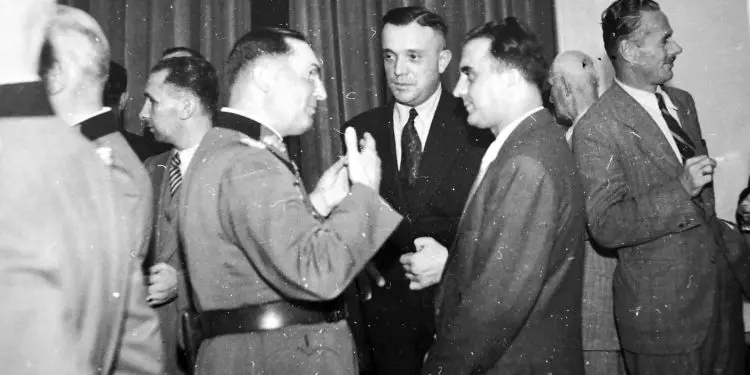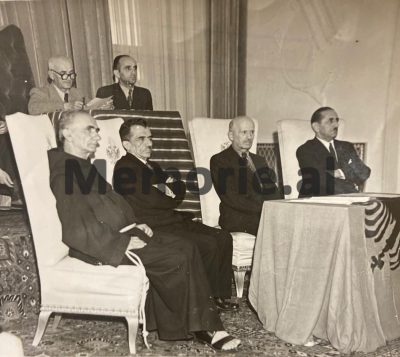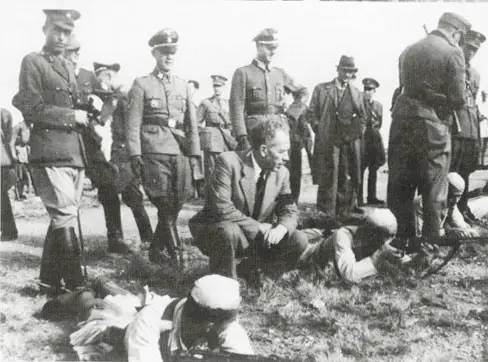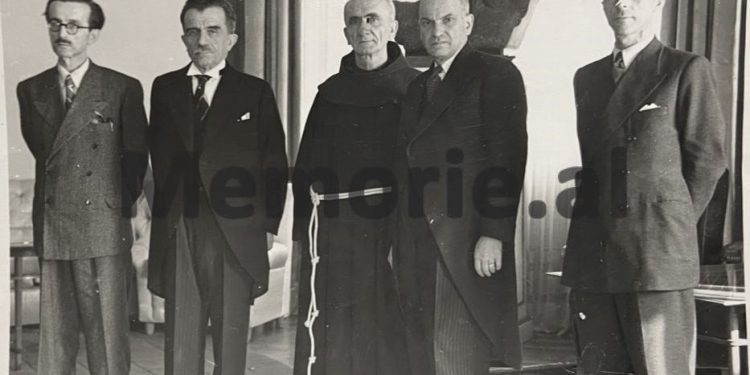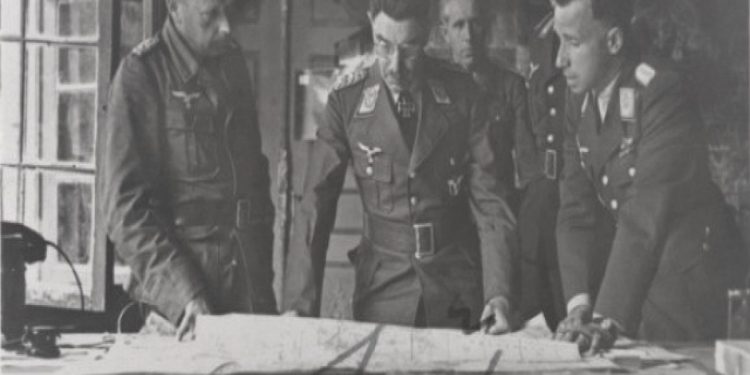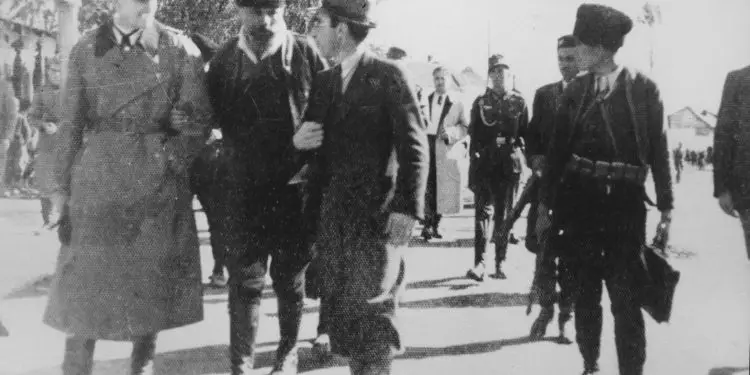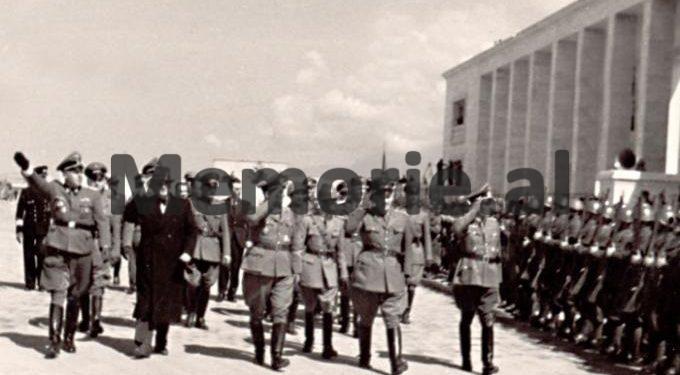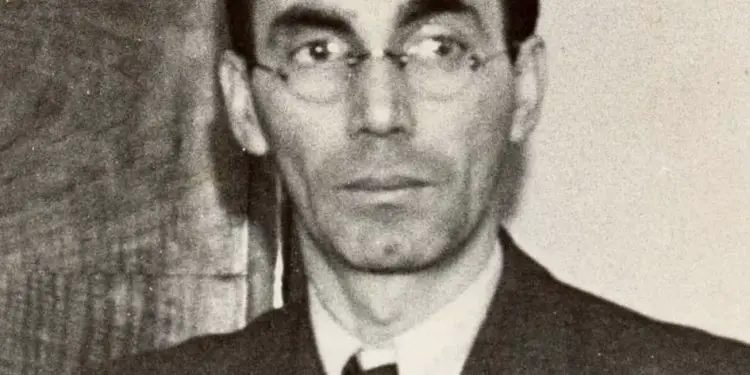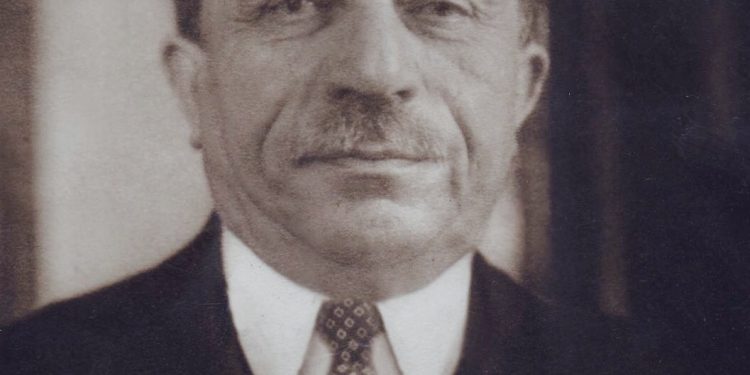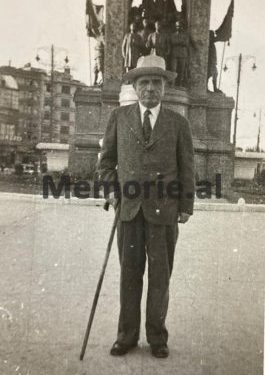Dashnor Kaloçi
Second part
Memorie.al publishes the unknown memoirs of Hermann Neubacher, the German Nazi diplomat, Hitler’s personal envoy to the Southeast Balkans, during the years 1943-1945, who, among other things, describes in detail the mission and adventure in his memoirs his Albanian, in the small country in the South of the Balkans. Neubacher published these memoirs in Germany, a few years after the end of the Second World War, summarizing them in a book, where he writes, among other things: “In my short and laconic Albanian task, there was something extraordinary. The German Foreign Minister, Ribbentrop, called me in Belgrade and informed me that: The Führer wanted to appoint me to Albania, which would be independent on its own initiative and in this regard, that the next day should I went to the XI Command of the German division, which was deployed in Elbasan “. Frashëri, Rexhep Mitrovica, Abaz Kupi, etc., in the optics of the Nazi diplomat, who served in Albania in 1943 – ’44
When at the end of August 1943, in the Führer’s main residence, Adolf Hitler, I accepted the post of “Authorizer of the Secretariat for Foreign Affairs of the Southeastern Balkans”, I had not yet heard of Albania and did not know enough about it. Small country in Southern Europe. Victor Emmanuel was still reigning there at the time, and one of his successors ruled the country. In my short and laconic Albanian task, there was something extraordinary. The German Foreign Minister, Ribbentrop, called me in Belgrade and informed me that: The Führer wanted to appoint me to Albania, which would be independent on its own initiative and in this regard, that the next day should I went to the 11th Command of the German Division, which was deployed in Elbasan “.
This is how he remembered his appointment to Albania, Hermann Neubacher, and the German diplomat Hitler’s personal envoy to the Southeast Balkans during 1943 1945, who, among other things, in his memoirs describes in detail the entire mission and his Albanian adventure, in the small country in the South Balkans. Neubacher published these memoirs in Germany a few years after the end of World War II, summarizing them in a book. But how did Neubacher come to Albania, what was his task, who were the Albanian politicians he collaborated with and how does he describe their characters in his book?
Continued from the previous issue
Memoirs of Herbert Neuenbaher, Hitler’s envoy to Albania
“After I left Berlin where I reported to the Center regarding the formation of the High Council (Regency), I returned to Albania. In those days, the National Council accepted the Government of Ibrahim Bey Bicaku, where Xhafer Deva took the post of Minister of Internal Affairs, which was one of the most problematic portfolios for the situation in which the country was. After the formation of this Government, the situation began to change in almost all respects. Everything that was previously in the hands of the Italians, no longer existed. Thus the legislation, the administration, the prisons, the police, the gendarmerie, the army, that is, the necessary attributes of the state, no longer existed in the hands of the Italians. But what was still present there, was a kind of traditional compactness of Albanian families and different tribes, which were very compact due to their characteristic roots.
In these circumstances, the German soldiers had no choice but to present themselves as maintainers of public order, despite the fact that they were in Albania only as guests. And indeed they were only guests. Thus, when the Supreme Command of the German Armed Forces appointed the military chief for Albania, I protested to the Minister of Foreign Affairs, Ribbentrop, for this mistake, calling it unacceptable, for the reason that we had recognized Albania as an independent state and its sovereignty.
In that context, on our part as Germans, we could not claim to have any administrative and legislative powers. “This stupid mistake of ours, was fixed in the country and military responsibility in Albania, was called” German General in Albania “, with the task of representing the German military forces in the Albanian Government”, recalls the Hitler diplomat, Hermann Neubache, sent to Albania on a mission, having been appointed Special Envoy for the Southeast Balkans.
Neubache: Mehdi Frashri, statesman
In his memoirs regarding the period of his stay in Albania, the German diplomat, sent by the Führer, shows a special interest, speaking with positive marks for the Albanian politicians, who would participate in the Government and would make possible overcoming the crisis that had gripped the country after the departure of Italian forces. In this regard, among other things, he recalls: “When in the first days of my arrival in the Albanian land, I had begun to be interested in the most famous personalities of the country; I soon concluded that one of those who enjoyed an indisputable respect, was Mehdi Bey Frashri.
Even the offers of the Italians could not break that former senior official of the high administration of the Ottoman Empire, in order for him to agree with the Italian aggression against Albania. The authority of his majesty had forced the Italians to deport him to Rome, where he lived in a hotel and with limited freedoms, with his daughter Mehdien. Based on Frashri’s personality, immediately after our arrival in Albania, I ordered that a “Heikel 111” plane be made available to him, so that he could come to Tirana. Along with that plane, he brought with him the reserves of the Albanian currency, which was kept in the Bank of Italy, for the Albanian National Bank, which was very well organized thanks to the Italian experts who had worked there.
Mehdi bej Frashëri, at that time, although he was 74 years old, was a very impulsive personality. He came from one of the main Albanian families, who had started his career in the so-called Balkan Turkey, as an administrator and later served in Lebanon and Egypt, in the rank of Pasha. It was erected as a monument from the Ottoman royal time. His wife was of Turkish origin, which Mehdi bey had acquired in her of his manhood. He was fluent in at least eight languages, but not German. In most cases we spoke in Italian.
If I dare to judge, I want to say that: Mehdi Frashëri was one of the founders of the high category of International Justice. He proposed to me that Germany accept the neutrality of Albania. According to him, we would be dealing with “guarantee neutrality” and Albania would consider the German armed forces, who had come to this country as guests, only for military needs and would have no harm from the forces warlike. Mehdi bey was very reserved about the developments and when he noticed that it was not about a German occupying regime in Albania, he aroused interest in the issues that belonged to his country.
When the People’s Assembly addressed him with a fervent appeal for his patriotic duty, he agreed to be put at the head of the Assembly as the first Speaker. In this Council, they had to be from a representative for Catholics and Orthodox and that task, had to pass from one to another. But Mehdi bey Frashëri always remained the first President, because his Orthodox colleague Lef Nosi, was ill, and the representative of the Catholics, the Superior of the Franciscans of Shkodra, Father Anton Harapi, rejected the post of President, with the motivation that: Catholic morality does not allowed him to accept a position that would force him to hand down death sentences.
The People’s Assembly, which had constitutional attributes, and the Council of Regency, which it elected, formed the Government, with Rexhep Mitrovica, originally from Kosovo, appointed Prime Minister and Xhafer Deva, Minister of Internal Affairs. “Mehdi Frashëri’s son, Vehbiu, was appointed Secretary of Foreign Affairs”, recalls Hermann Neubache, the period when under the German occupation, Albanian governments were created that did not have a long life.
Neubache: No “Skënderbeg” battalions!
Respecting the principles of neutrality of Albania, which had been recognized by the German state, its special envoy, Hermann Neubache, insisted that: the rights arising from this, be implemented with the utmost rigor. In this regard, he was against the creation of a battalion of volunteers from Kosovo christened “Skanderbeg”, despite the fact that he fought against Serbian Chetnik forces, who had been massacring the indigenous Albanian population living in its lands for decades.
Regarding this, among other things in his memoirs, diplomat Hermann writes: “When I accepted the task regarding Albania, in the province of Kosovo there were armed people who were tracking down the fighters of the Muslim SS Division, known as” Hanxhar “. , which was formed in Bosnia. Then with the help of Kaltenbrunner, I managed to persuade Himmler to stop these recruitments, which did not agree with our policy of neutrality. But Rice Firer SS, who had heard many incidents and stories about the Bosnia-Herzegovina regiment of the Danube monarchy nevertheless came to his goal in 1944, to persuade Hitler to form in Albania for the needs of local partisan warfare within borders, an SS Mountain Division, called “Skanderbeg”.
This was done in the early stages of the fighting and since he was misguided, he suffered significant losses in the war with the partisan forces. The formation of this battalion did not excite me at all, but the Albanian Government saw the formation of such a Division as a very convenient opportunity because it believed that with its help it would form a perfect and suitable framework for the national armed forces as and those of the gendarmerie.
“The garrison of this unit was in Prizren and I deliberately prevented its deployment in Mitrovica, which remained on the borders of Serbia, because I was afraid of conflicts with the Serb population, who were always at war with the Albanians,” recalls Hermann Neubache, when he opposed the recruitment and formation of the “Skanderbeg” Division, with Albanian volunteers, which, according to him, would lose Albania the card of neutrality and at the same time its independence.
Neubache in defense of Albanians
In charge of the special envoy for the Southeastern Balkans, German diplomat Hermann Neubache tried to balance the Balkan tensions between Albanians and Bulgarians, given how the Italians and Germans had recognized the borders of Ethnic Albania, which bordered on its east with Bulgaria. In this regard, in his memoirs, the special envoy of the Führer, among other things, writes: “After the destruction of Yugoslavia, in July 1941, the Albanians met the province of Kosovo, densely populated by them.
Since 1939, Albania had been annexed to Italy and after its liberation, the Albanians rushed to expel as many colonizers who had oppressed them for years. When General Nedi mu addressed me with very harsh complaints, I strongly advised the Albanian government to end the persecution of the settlers. When I noticed that my intervention in this direction was unsuccessful, I threatened my superiors with my resignation from the Albanian duty I had taken over, emphasizing that: I would entrust to another the care to keep this country, from territorial desires of the Bulgarians.
Xhaferr Deva, who had a great influence in Kosovo, promised me that he would be interested in this problem and he did it with great success. However, from 1941 onwards, many unpleasant events took place between Albanians and Bulgarians. Bulgarians constantly complained about the killings of Bulgarians in Eastern Albania, where, in fact, there were no Bulgarians at all. This was done in order to demand the right from Germany to annex the endangered territories. Based on this, I directed Colonel Von Kohautek (who was assigned to my headquarters in Belgrade), north of Lake Ohrid, to politically analyze the killings that had taken place in recent months in that area.
Colonel Von Kohoutek meticulously studied the 40 murders and found that there were no Bulgarians among those killed. Almost all of those killings belonged to the old revenge and hostility categories between families and tribes as banal killings. One murder case had to do with the liquidation of a communist by a communist, while some other murders could not be explained.
After all those explanations about the murders that the colonel I appointed did thoroughly, it did not seem necessary for the Bulgarian forces to occupy the Albanian territories, the result of which would be to the detriment of my fame in the big Bulgarian circles. “In those circles I had poor assessments and grades, since the time I obstructed the Thracian plebiscite,” recalls the German diplomat, his efforts to curb the appetites of Bulgarians (Macedonians) to invade Albanian territories.
The fall of the Government of Rexhep Mitrovica
In his memoirs related to the period of his stay in Albania, the diplomat Hermann Neubache, intensively analyzes the Albanian politicians and the governments they headed. Regarding this, he writes: “In June 1944, Prime Minister Rexhep Mitrovica resigned, on the pretext that he was ill. This man was indeed ill and had no opportunity to do great work in the task he had undertaken. From this it remained that the field of political power, wandered defined, between the contradictions of the old Albania (Mehdi Bej Frashëri) and the new Albania (Xhaferr Deva).
But Xhaferr Deva also retired in June 1944, thinking of going to Germany for treatment and then devoting himself entirely to strengthening his position in Kosovo. At that time I experienced the crisis of the Albanian government, which lasted about three weeks. It remained unforgettable for me. With full consequence, we have rejected our preferences for electing any candidate for the post of Prime Minister.
Every day there were different combinations regarding the possible candidates and those waves collided in my conscience which in Tirana served me as a safe rest. In the beautiful hotel “Dajti”, which was built by the Italians, gathered famous guests, who with their people had descended from the mountains, so as not to stay far away, when the new Minister of Finance accepted the task. “The rifles and automatic rifles that the accompanying voice personalities carried with them gave the life of that hotel a warlike look,” recalls the Nazi diplomat, Neubache, Albanian politicians and political events in Albania in 1943-44, where he himself was one of its main actors./Memorie.al




